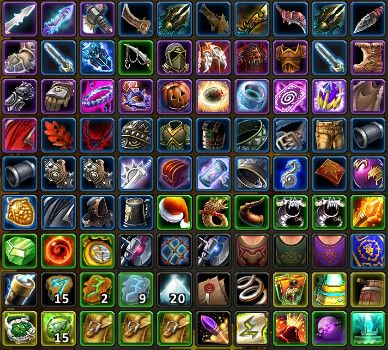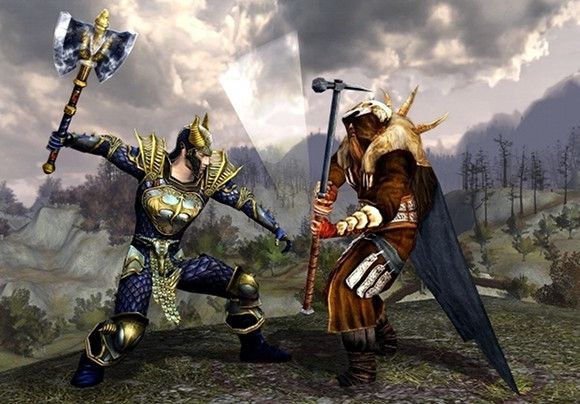Games are often viewed as entertainment, yet the lessons learned in them can be useful in real-life situations. Learning to balance present needs against future plans in a strategy game can also help players decide the right course of action in the real world, and the twitch skills learned by gamers can help them quickly react to objects they see.
Role-playing games, a genre where players embark on quests to defeat great evil in often fantastic worlds, may seem to have the least real-world benefit. Not so - these games usually require proper management of limited money and resources. Habits that work well in these games can be a boon to your wallet.
Don’t Hoard - Sell!
Gamers with virtual riches rarely obtain their status because of their ability to hold on to things. Items tend to become obsolete quickly in RPGs and, once an item is no longer useful, it should be discarded.
This is because selling old items generates income, but that’s only part of why discarding only stuff is a good idea. Inventory is the other half of the argument. Old items, if allowed to pile up, can make separating valuable items from junk more difficult. Eventually the player may even run out of space, at which point the player has to either stop picking up new, useful items or junk old stuff, missing out on value that might have be obtained from selling it.
Learning when to let go in-game may be a bother, but it’s one of the rules that separates people who end their games rich from those constantly struggling to find cash. You can practice the same tactics in real life by selling old, unused items on Craigslist or donating them to a charity.
A Little Bit Every Day Adds Up
http://youtu.be/kDAJpKuLPRs
Finding value in work can be hard. Working a couple of extra hours of overtime at a $15/hour job is only $30 extra. Finishing a project that can be sold for $100 isn't even enough to buy a new game console. Mustering the willpower to finish work, or strive for more, can be difficult when the short-term benefits aren't obvious.
Online RPGs can help you see why these efforts are worthwhile. Most have quests known as “dailies” that can be completed every day for some small monetary reward. It’s not much - usually far less that needed to buy a new weapon - but after a few weeks, it adds up. Doing a pair of daily dungeons every weekday for two weeks in World Of Warcraft, for example, generates enough income to buy a great piece of high-end armor.
Games also mimic real-life by introducing other benefits besides currency. Doing a daily might make your character more skilled at a craft, increase your reputation with a certain group or improve your standing in your guild. None of these bonuses appear noteworthy at first but, over time, they add up to a character who has cash, useful skills and a reputation with others.
Work Smarter, Not Harder
http://youtu.be/ZabqiBIxqqk
This old cliche is generally considered true, but it’s hard to understand in the real world where “working smarter” might be embarking on a new career path that takes a decade to come to fruition.
Games offer a briefer lesson. In most role-playing games it is possible to advance by finding a place where you can kill a lot of enemies or harvest a lot of resources and then sell whatever you loot, but that’s rarely the best solution. Making the most with the least effort requires a bit more thought and research.
For example, as a new high-level player in an MMO you might run straight towards harvesting all the high-level crafting resources that you can find. Higher level stuff sells for more, right? Well, maybe not. Sometimes low-level items sell for more because leveling characters rarely farm items, so there’s only a handful of people selling them. Or an item might only be available in a low-level dungeon most people don’t want to re-play.
And if you really want to make money - outrageous amounts of money - you’ll need to find and predict trends in a game’s market. This requires a lot of thought but, when done right, it can make your a virtual millionaire (literally!).
Cornering virtual markets in a role-playing game can take weeks, but that’s nothing compared to the time you’d spend doing the same in the real world. And you don’t have to jeopardize your life savings!
Compound Characters
Role-playing games hold character advancement as a core gameplay concept. As characters become more powerful and more skilled their stats, weapons and resources all go up. In some cases a character may be twice as powerful as another just a few levels below.
This rule is applicable to many real-world challenges including finances. As anyone who has over-drafted a bank account knows, having no money can be expensive. Charges can pile up and lead to a never-ending spiral of fees. On the other hand, having a lot often leads to even greater riches. A person or company with a lot of money can risk a new business others simply couldn't afford.
The core lesson is it pays to worry about how you gain money rather than how you spend it. Some people in the real world will spend hours clipping coupons that add up to savings. That seems like a great deal - until you consider opportunity costs of lost work, relaxation time, storage space and etc. These individuals even buy items they won’t even use.
Imagine the same behavior in an RPG. If a player decided to skip the items that are best for their character because they were too expensive, and instead picked the cheapest, they’ll spend less. But they’ll also be less effective and may have trouble advancing. Spending money on the right tools is what every strategy guide recommends because it allows for far quicker advancement and more, better rewards.
This is not to say you should buy everything, or anything, you can imagine. Try that and you’ll go broke both in an RPG and real life. But you should spend money on items that help you advance and perform at your peak.
Conclusion
All of these tips boil down to optimization. In RPGs this is known as "min/maxing" - gaining the most benefit from as little effort as possible. Online forums and websites into great detail comparing stats, costs and abilities to find how characters can perform at their peak.
Those who don’t game often view the efforts of these individuals as a waste of time. When taken to their extreme, they can be. But RPGs also provide a low-cost sandbox where players can try financial strategies that have real value in the real world. And, because they require relatively little effort and money to enjoy, the cost of failure in an RPG is almost zero. You can always roll a new character and try again.



